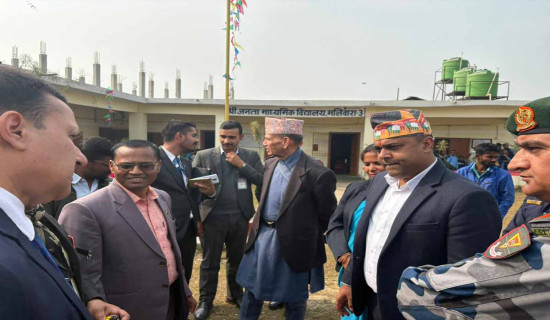- Wednesday, 28 January 2026
Identify The Genuine Candidate
In his essay, “Truth and Falsity in an Ultramoral Sense,” Nietzsche writes that “truth is a mobile army of metaphors, metonymies, anthropomorphisms,” meaning there is no fixity of truth, it is rather an abstraction and people rationally submit to the abstraction believing an illusion as truth in order to live socially. With that said, Nietzsche questions or deconstructs the idea of truth and points out to us to think of the “truth” critically. The fundamental basis of truth for one comes through cultures one live and that guide politics, policies, politicians, and people. Thus, the idea of “truth” and “falsity” must be analysed in many contexts.
Cultures are our morals and our values. They are the symbols of civilisations. Cultures are essentials to authenticate the society, to civilise it. Cultural variations inform people differently, so is the understanding and perception of people around the world about the world. Culture guides our ideals and the way of life, demeanors, manners, and philosophy of what is good and what is bad, what is truth and what is false. Whatever we consider as bad/false might be something good/true for people from another culture.
Diverse culture
Nepal is such a place where diverse cultures are into play. As we know, our behaviours, actions, performances, attitudes and perceptions are based on the culture we were brought up in. We define who we are and our ideals based on what we eat, what we wear and other cultural values and practices around us. They are deeply rooted in our brain. We assume that going beyond such cultural practices is bizarre and unethical, and we, at times, end up falling into an illusionary frame of “good culture.” Thus, merely the cultures we lived in should not define what is true and what is false, what is right and what is wrong, and what is good and what is bad.
Good culture is not the one that indoctrinates only your culture is right. It mentors one to respect others and learn to walk in their shoes. It helps one avoid cultural biases that may bring tensions and cannot address the emotions of the diverse people. Good cultures teach one not to lie to others, discourages to disseminate illusions of conspiracy theories. Good culture teaches one to speak the truth, to say the right thing and do the right thing. It bolsters democracy which is indispensable to guide society towards the path of sustainable development of the nation. Politics without good culture is like a jungle that has a place for wild creatures.
Although Nepali cultures place a primary emphasis on tradition and the wisdom of respect for elders who are the links to these past sources of knowledge or cultural practices that are passed down from older generations, such cultural practices, at times, have terrible side effect in Nepali politics by creating an illusion of “truth.” Our politics and the way it is running works like a culture that teaches us morals, such as loyalty, tolerance, patience, faith, and dependability. We are hardly taught to question the authority unlike the culture in European countries where appreciation is received for being critical of the person in power.
We hardly accept the change, for example the one — who is attached to one party and the history shows his predecessor, including his grand-father and father have been voting for the same party — hesitates to vote for another party even if the leader is more visionary. It is all because the person does not want to break the tradition of remaining in the same political party and wants to continue to keep the legacy of their forefathers. The person does not want to disrespect the tradition of voting for the same political party his parents and grandparents voted for. Or they feel threatened or humiliated if they chose a different one. Such practices are taken for granted as a tradition, a loyalty towards their elders. However, our younger generation these days somewhat become critical of the government, the political party, and the leaders, questioning the existing cultures in politics.
Accountable leaders
In terms of maintaining a cordial relationship and respecting the elders, our culture mentors a lot, but when it comes to politics, such cultures hinder the progress of the nation. We need to keep such cultures in check and balance to understand how cultures shape our politics and policies while exploring an illusion of what is true and what is false. We are going to elect the 275 members of the House of Representatives on November 20, 2022. We all want that those members to be honest, diligent, dutiful, and accountable towards Nepali people and the nation. We want them to disseminate right work, right message, and right policy.
When those members whom we elect fail to perform as promised, they cannot be considered a true candidate. Only policies can never guarantee the nation’s progress when the elected members cannot act responsibly and diligently. Therefore, our duty is to know and elect the best and true candidate who can effectively and responsibly represent Nepali people. Let’s find a true, not a false candidate. Let’s not submit to the abstraction believing an illusion as truth in order to live socially.
(The author is a director of Social Science Department of Nexus Institute for Research and Innovation (NIRI), Kathmandu.)

















